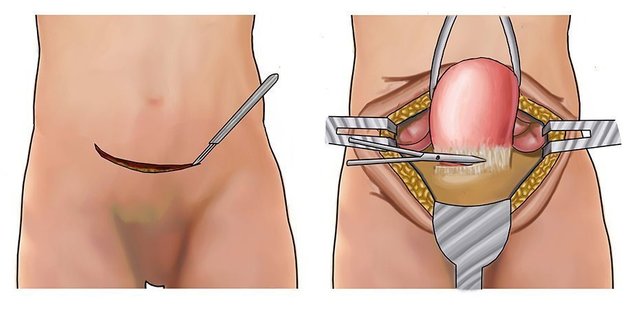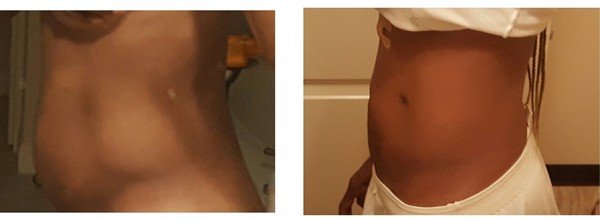Uterine fibroids and hysterectomies are hotly debated topics. What most agree upon if a woman with tumors is contemplating this surgical procedure is that she should make an informed decision after reviewing various alternatives including fibroid natural treatment options. Unless a woman’s life is in danger, hysterectomies should never be the first option. All other options should be considered first.

Fibroid tumors most of which go unnoticed in some women but in many other women may produce various symptoms such as pelvic pain and pressure, heavy bleeding, prolonged menstrual cycles, growing very large and pressing upon the surrounding organs, causing pregnancy complications, and so on and so forth which can be very uncomfortable to have to deal with.
There are many uterine fibroid treatment options including various surgical procedures as well as fibroid natural treatment options. Hysterectomies are the number two surgical procedure performed on women (after the caesarean section) each year. The most common condition for which hysterectomies are performed each year is because of fibroid tumors.
There are different types of hysterectomies such as;
- The supracervical hysterectomy is a partial hysterectomy and does not get rid of as much as the total hysterectomy. Only a portion of the uterus is removed (usually the top) which leaves the cervix attached to the vagina and the surrounding ligaments.
Compared to a total hysterectomy, pain and complications post-surgery are less severe. It is important to note that this partial hysterectomy is rarely performed nowadays.
- The second type is the total hysterectomy which removes the entire uterus including the cervix. The ovaries may also be removed during this procedure (oophorectomy) as well as the fallopian tubes (salpingectomy).
Surgical Procedures
- If the tumors are small, the doctor may perform a hysterectomy through the vagina. This vaginal hysterectomy takes less time and leaves no external scar. It also takes less time to recover from this procedure.
The only disadvantage with this procedure done through the vagina is that the doctor may not be able to see the entire abdominal cavity and may accidentally injure the rectum and bladder.
- If the tumors are large, abdominal surgery may be the best option. Doctors prefer this method and it is the simplest procedure for any size tumor. It will leave a scar on the abdomen and the recovery time is about four to six weeks with up to five days of that time spent in a hospital.
Uterine Fibroids and Hysterectomy — The Good
Since the total hysterectomy is usually performed, it leaves no uterus. This means that there will be no recurrence of fibroid tumors. Of all the surgical procedures, this is the only one that gives a permanent solution to the problem of uterine fibroids.
Without a uterus or cervix, the risk of uterine and cervical cancer is eliminated.
Unlike other surgical procedures like a myomectomy (surgical removal of only the tumors), pelvic pressure and heavy bleeding are completely eliminated.
Compared to a myomectomy and other surgical procedures, the hysterectomy is much easier to perform.
Uterine Fibroids and Hysterectomy — The Bad
The contentious issue with hysterectomies is that many doctors will recommend this surgical procedure without discussing many other options with the patient. In only very few cases are hysterectomies necessary such as cancer or when a woman’s life is at risk as a result of pregnancy complications, emergency bleeding, etc?
This means that in many of the hysterectomies performed each year, the surgical procedure may have been unnecessary. It is also important to note that there are some women who after researching various alternatives including fibroid natural treatment options, may make the decision to have this surgery.
Various studies have found that 30 percent of hysterectomies or 1 in 3 hysterectomies may have been unnecessary. In addition, of all the Western countries, hysterectomies are performed the most in the US than anywhere else in the West.
Then why do many doctors recommend it without offering alternatives in many cases? Because it is a neat, clean way and provides permanent results for your gynecological issues. It also takes care of future problems such as uterine and cervical cancer risks.
Uterine Fibroids and Hysterectomy — The Ugly
Uterine fibroids affect African-American women at 3 times the rate of women of other races and they also have more symptoms. With this in mind, it has been discovered that African-American women are 25 percent more likely to have this procedure performed and they are also more likely to have complications from the surgery and longer hospital stays.
The worst is that African-American women are more than three times more likely to die in a hospital from this procedure a study has found.
The major result of a hysterectomy besides eliminating fibroid tumors is that it will erase all hopes of ever having children. Without a uterus, no pregnancy can result. Although this may not bother some women especially if they have no interest in having children or are done having children.
In many cases when a hysterectomy is performed, the ovaries may also be removed at the same time which can lead to a condition called surgical menopause which can be more severe than the natural kind. Some doctors may decide that you do not need your ovaries but ovaries are necessary during any period in any woman’s life including menopause.
Ovaries even during and after menopause produce hormones that are beneficial to the body and especially help to slow down bone loss and regulate libido during and after menopause.
There are also many other risks of a hysterectomy including death so it is important to review all options including fibroid natural treatment methods before deciding on this path to cure uterine fibroids.
The other effect of hysterectomies is that it affects many women psychologically especially because of their perceived loss of femininity which they may attach to having a uterus and various other female reproductive organs. This can be devastating for some women leading to depression.
The loss of these organs may also lead to hormone changes which can affect their libido and they may experience dryness or pain. Some women may even lose their ability to orgasm.
As mentioned previously, some women do choose to have a hysterectomy and if you do, some questions you may want to ask yourself include but are not limited to;
Have you gotten a second doctor’s opinion, or third or fourth?
Do you want to have kids or more kids or is this chapter of your life over
Have you looked into other surgical procedures such as myomectomy or uterine artery embolization (UAE)?
Have you looked into other alternative treatment options such as various fibroid natural treatment methods?
Have you discussed the various side effects of a hysterectomy with your doctor and other important people in your life?
Are you okay with not having a uterus and have not attached your feminine identity to having a uterus?
With so much discussion about hysterectomies, it is important for a woman to consider all options including fibroid natural treatment methods even when she has severe symptoms because there may be other alternatives that may be quite effective for treating uterine fibroids without resorting to having a hysterectomy.
Here is the good news.
Eliminate Your Uterine Fibroids Naturally In As Little As 21 Days
If you’re trying to cure your PCOS or battling any type of uterine fibroids, you MUST check this out.
Medical researcher, alternative health and nutrition specialist, health consultant, and Former Uterine Fibroids Sufferer teaches you how to:
Eliminate Your Uterine Fibroids Naturally In As Little As 21 Days
and Prevent Their Recurrence
Tackle Pelvic Pressure and Pain, Bloating, and Discomfort
in Less Than 12 Hours
Boost Your Fertility and Gain Regular Periods (No More Spotting or Unexpected periods)
Stop Bladder Pressure
Treat Heavy Menstrual Flow (Menorrhagia) or Painful Menstrual Flow (Dysmenorrhea)
Treat Pain During Intercourse (Dyspareunia).
Improve the Quality of Your Life Dramatically!
Discover how she overcame her own Uterine Fibroids and taught thousands of women worldwide to treat all their Uterine Fibroids and all related issues quickly, safely, and naturally

Even If You Have Very Large Uterine Fibroids
Even If You Have Endometriosis
Even If You Are Menopausal
Without Resorting To Drugs or Surgical Procedures
Faster Than You Ever Thought Possible!
Here is a short video that explains it better than I can https://bit.ly/Ufibroidsnomore